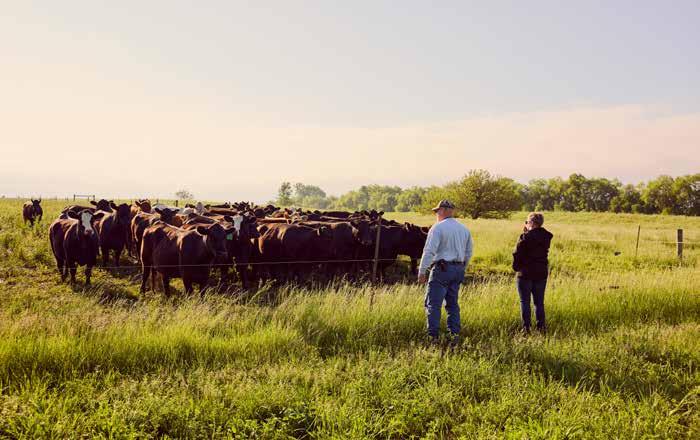
5 minute read
Farm Bill Roulette
Will we see a new farm bill in 2025?
By Olivia Hoots
While I have never darkened the door of a casino, I know the term roulette is used for a situation where you are placing all your bets on something hoping that maybe THIS time a situation will work out in your favor. Although you may never find yourself placing bets on the end game of government policies, the “endless” 2018 Farm Bill is beginning to feel more like a game of chance where the current bill keeps winning when a new one is meant to take its place.
The end of 2024 saw the 2018 Farm Bill expire, again, and extended until Congress can pass a new one by September 30. With the Trump Administration doubling down on many issues quickly, there is hope Congress will be encouraged to get a new farm bill to the oval office this year.
In 2022, at the NCBA Summer Business Meeting in Reno, Nevada, cattle producers determined what the new farm bill, which was set to be established in 2023, should include and be lobbied on behalf of beef producers.
The priorities determined are as follows –
Strengthening risk management programs that provide producers with added protection against weather events and price decline.1
Supporting disaster recovery programs that help producers return to normal operations following adverse weather, attacks by predators, or extreme conditions like drought and wildfire.1
Promoting voluntary conservation programs that recognize the value of producers’ nationwide conservation activities, and support implementation of these practices free from government mandates.1
Protecting animal health through programs that guard against the spread of foreign animal diseases. This includes support for programs like the National Animal Vaccine and Veterinary Countermeasures Bank (NAVVCB), which currently houses the Footand-Mouth Disease vaccine for U.S. producers. NCBA previously advocated for this vaccine bank and livestock producers recognize the danger that a foreign animal disease poses to the industry and the protection this bank provides.1
Blocking a stand-alone livestock title. A livestock title would open the door to unnecessary overregulation and harmful government mandates and could cause difficulty getting the Farm Bill reauthorized.1
In May of 2024 when the House Agriculture Committee reported a Farm Bill favorably with a 33-21 vote –H.R.8467, or the Farm, Food, and National Security Act of 2024. It was introduced to the House by Republican Representative Glenn Thompson. “Cattle producers are thankful that the House Agriculture Committee has advanced a Farm Bill that delivers on the needs of rural America,” said then NCBA, Mark Eisele.
In December, the Congressional Research Service (CRS) published the following in regard to the filed bill –
“On November 8, the Congressional Budget Office (CBO) published a score of H.R. 8467 based on the June 2024 CBO baseline. The score indicated the bill would increase mandatory spending that is subject to budget enforcement by $28.1 billion over 10 years (FY2025FY2034). It would provide a net increase for farm commodity support programs of about $37.0 billion over 10 years; a net increase of $4.5 billion for conservation programs including incorporating funding from P.L. 117-169 (referred to as the Inflation Reduction Act); a net decrease of $27.1 billion for the domestic nutrition programs by limiting future increases to the Thrifty Food Plan (TFP) that is used to determine Supplemental Nutrition Assistance Program (SNAP) benefit levels; and an increase of $13.6 billion for other titles.”2
According to the CRS’s research report R48167, this bill would “reauthorize most existing programs through FY2029, with modifications to specific programs and funding levels,” although there would also be some modifications. 2
Unfortunately, this bill died with the previous Congress, along with NCBA’s top industry priorities that were included in the bill, forcing another 2018 Farm Bill extension.
Even so, NCBA leaders and staff and cattle producers across the country seem keen to continue encouraging Congress to pass a Farm Bill in 2025, especially 2025 NCBA president, Buck Wehrbein. “Congress must always remember that food security is national security and the policy decisions they make will impact the hardworking cattlemen and women who produce our nation’s food. Passing a Farm Bill, axing the Death Tax, protecting beef in the Dietary Guidelines, rolling back excessive regulations, holding our trade partners accountable, combating the New World screwworm, and protecting the Beef Checkoff are all tangible steps Congress can take to support American farmers and ranchers and protect our food security,” he said when testifying to congress in late February 2025. 3
So will we see a farm bill in 2025? NCBA is hopeful of it. At the 2025 CattleCon held in early February in San Antonio, NCBA Executive Director of Government Affairs, Allison Rivera, said they are focusing on NCBA’s priorities, including animal disease preparedness and the vaccine bank.
Also at CattleCon, NCBA Executive Director or Government Affairs, Tanner Beymer, was also hopeful. According to him, Thompson is still enthusiastic about getting a farm bill to U.S. farmers by the end of 2025.
What’s your guess? Are we making an outside bet?
Sources:
Farm bill. National Cattlemen’s Beef Association. (n.d.). https://www.ncba.org/policy/farm-bill
Congressional Research Service. (2024, December 16). The 2024 farm bill: H.R. 8467 compared with current law. Congressional Research Service. https:// crsreports.congress.gov/product/pdf/R/R48167
Perspectives From the Field: Farmer and Rancher Views on the Agricultural Economy, Part 2. (2025).






